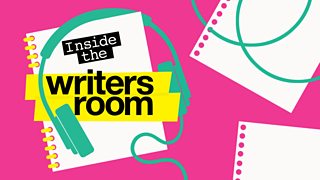Inside the Writersroom - a new series of podcast interviews with the UK's leading TV drama writers
Abigail Gonda
Development Producer, 主播大秀 Writersroom
Tagged with:
When the idea first came up, to interview TV drama writers for the 主播大秀 Writersroom’s first podcast series, , the consensus was to make it as intimate and insightful as possible for our listeners. That meant keeping the process simple and unencumbered with minimal production staff, editing and equipment – in other words me and a recording device.
The aim was to capture a nuts and bolts style interview to get to the nitty gritty of the writers' processes. A dream list of writers was put together. was the first (and fastest) to say yes. After that, it wasn’t hard to get others on board.

The idea behind going to the writers’ homes and recording the interviews from where they write, was to strip away formality and have the writers feeling comfortable enough to divulge their deepest and darkest secrets. Hopefully you’ll think that it worked! Twenty general questions are used as a loose guide to the conversation so there was some uniformity across the interviews. It’s fascinating to see the wide range of responses to most of the questions. There are a few questions that now seem like duds. For example, “Do you celebrate when you finish a script?” Despite hoping for a champagne pop, as it turns out, no writer – at least in this series - ever really feels this is the end of the process. For the most part they are too busy and humble to stop and gloat over their achievement. The list of questions was also tailored depending on the direction the conversation was taking and the particular experiences of the writer.
Most of the interviews ended up being between 90 and 120 minutes in length. Even though the hope was that editing would be light, the process of actually listening to the six interviews took days of work with the editor. It’s amazing how meandering a conversation can become and how annoying my voice began to sound! So we cut as much of that stuff as possible and tried to mostly just let the writer speak. You’ll probably hear more ambient sound than you’re used to in interviews. For example, the rather rude sounding squeaks of a sofa in Sally Wainwright’s interview (I also apologise for the less than brilliant sound quality we were unable to rectify in the edit) and the children shouting in the school playground next door in and ’s interview. You’ll hear people masticating, smoking, scratching and sipping drinks. Hopefully this all adds to the authenticity of the interviews…or something!
What feels most important about the series is that they are useful in some way to the listener. Whether you’re an established, emerging or aspiring writer, hopefully you’ll find things that inspire you and perhaps make you feel less alone in what can otherwise feel like quite a solitary endeavour. What’s clear from these interviews is that the writers are immensely respectful and supportive of each other’s work and achievements – they see these as a collective success. I like the idea of peer support and encouragement in the writing landscape. There’s no doubt we are in a golden age for television writing – with more outlets and appetite than ever. Whether you write twenty drafts for every one draft you send out – like – or aim for one draft with no notes like Sally Wainwright, there’s certainly never been a more exciting time for television drama writers.
Hopefully this first series of compels you to persevere with your craft and perhaps offers something that improves your own writing process.
Please listen, share and rate .
You can or from Wednesday 13th September 2017. The full line-up is:
